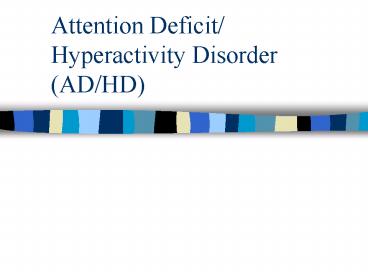Attention Deficit Hyperactivity Disorder ADHD - PowerPoint PPT Presentation
1 / 26
Title:
Attention Deficit Hyperactivity Disorder ADHD
Description:
Attention Deficit Disorder with or without hyperactivity ... Etiology AD/HD: Russel Barkley Theory. Self-Regulation begins with behavioral inhibition. ... – PowerPoint PPT presentation
Number of Views:683
Avg rating:3.0/5.0
Title: Attention Deficit Hyperactivity Disorder ADHD
1
Attention Deficit/ Hyperactivity Disorder (AD/HD)
2
History Early Conceptualizations of ADHD
- Emphasis on attention vs. hyperactivity changed
3
AD/HD HistoryDSM-III
- Attention Deficit Disorder with or without
hyperactivity - Attention deficits were the focus (not
hyperactivity)
4
AD/HD History DMS-III-R
- Attention Deficit Hyperactivity Disorder
- Mix of inattention and hyperactivity
- Attention was somewhat primary
5
AD/HD History DSM-IV
- Attention Deficit/Hyperactivity Disorder
- Factor analytic studies resulted in two factors
attention and hyperactivity
6
AD/HD Diagnostic Criteria Inattention
- Makes careless mistakes
- Difficulty sustaining attention
- Does not seem to listen when spoken to directly
- Does not follow through on instructions, fails to
finish work - Difficulty organizing tasks
- Avoids sustained effort tasks
- Loses things
- Easily distracted
- Often forgetful
7
Attention
- Selective Attention (Distractibility) attention
to relevant stimuli - Sustained Attention (Vigilance) attention to a
task over a period of time Continuous
Performance Test - Attention capacity-amount of information in
short-term memory
8
AD/HD Diagnostic Criteria Hyperactivity/Impulsivi
ty
- Hyperactivity
- Often fidgets with hands or feet or squirms
- Often leaves seat
- Often runs about or climbs excessively
- Difficulty engaging in activities quietly
- Often on the go, driven
- Talks excessively
- Impulsivity
- Blurts our answers
- Difficulty waiting turn
- Frequently interrupts
9
Dimensions of Impulsivity
- Cognitive Impulsivity
- Disorganization
- Hurried thinking
- Need for supervision
- Behavioral Impulsivity
10
AD/HD Subtypes
- Attention Deficit/Hyperactivity Disorder
predominantly inattentive type - Attention Deficit/Hyperactivity Disorder
predominantly hyperactive-impulsive type - Attention Deficit/Hyperactivity Disorder
- Combined type
11
Problems with AD/HD Criteria
- Symptoms are not developmentally sensitive
- Just below threshold problem
- Criteria for age of onset is questionable
- Criteria of symptoms for 6 months may be too
short for preschoolers
12
AD/HD Prevalence
- Prevalence rates 2-12
- More common in males
- Cultural variation in rates
13
AD/HD Co morbidity
- Oppositional Defiant Disorder
- Conduct Disorder
- Anxiety Disorder
- Depression
14
Etiology AD/HD Neurological
- Abnormal Brain Structure- normal brain is
assymetrical with right side being somewhat
larger than left. - In AD/HD
- -Smaller right frontal area or
- Left and right sides equal size
- Abnormal Functioning- underactive
frontal-striatal area (dopamine and
norepinephrine)
15
Etiology AD/HD Genetic
- There is strong evidence for genetic influence.
- Family studies between 10 and 35 of first
degree family members are likely to have AD/HD. - Twin Studies Concordance rate identical twins
(65) is about twice that for fraternal twins . - Specific Gene Studies dopamine transporter gene,
gene that codes for dopamine receptor gene, and
multiple interacting genes on several chromosomes
16
Etiology AD/HD Environmental Influences
- Not influenced by
- Parental management of the child
- Diet, allergies, lead
- Can complicate
- Family interactions and stress
17
Etiology AD/HD Russel Barkley Theory
- Self-Regulation begins with behavioral
inhibition. - Those with ADHD are not able to inhibit their
responses
18
Treatment AD/HD Medication
- Medication is the most effective treatment
- Dr. Charles Bradleys accidental discovery
19
Treatment AD/HDMedication
- Psychostimulants
- Methylphenidate (Ritalin)
- Amphetamine (Dexedrine)
- Magnesium Pemoline (Cylert)
- Side Effects Psychostimulants
- Growth delay (time limted)
20
Treatment AD/HD Medication
- Tricyclic Antidepressants (Inimpramine)-effective
- Side effects-effects on heart rate and blood
pressure - Caffeine some effectiveness-further study needed
21
Why Are Stimulants Effective?
- Barkleys theory
- Alter fronto-striatal brain activity through
effect on neurotransmitters dopamine,
norepinephrine and epinephrine
22
Treatment AD/HD Behavioral
- Parent management training
- Taught about AD/HD
- Taught behavioral control techniques
- School-based Educational Interventions
- Behavior modification applied in the classroom
23
Treatment School-based Interventions
- Behavior Modification applied in the classroom
reward systems, consequences for off task
behavior, developing cues
24
Treatment Individual Therapy
- Behavior Therapy
- Cognitive-Behavioral Self-Control Training
- Individual Counseling
- Social Skills Training
25
Treatment Multimodal Intervention Study Design
- National Study
- 600 children ages 7-9
- Randomly assigned to
- --Medication alone
- --Psychosocial/behavioral tx. alone
- --Combination Treatment
- -- Routine Community Care (Control)
26
Treatment Multimodal Intervention Results
- For AD/HD Symptoms
- --Meds alone Combined TreatmentgtPsychosocial/Beh
avior Routine Community Care - For Other Areas of Functioning
- --Combined treatmentgt Rountine community Care
- --Meds. AloneRoutine Community Care































